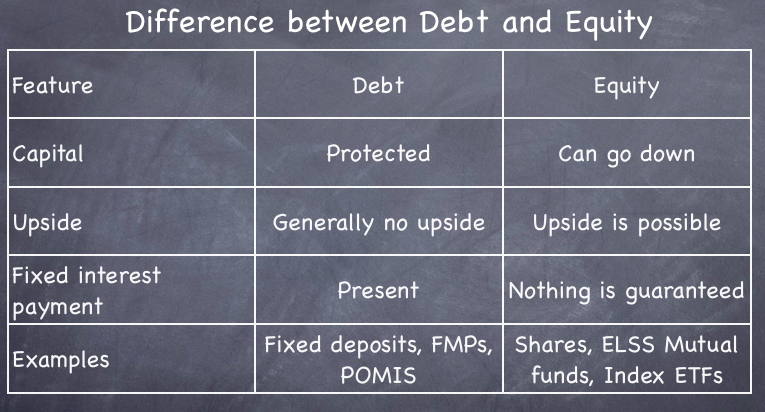This is another post from the Suggest a Topic page, and this time we’re going to take a look at the difference between debt and equity products, and some examples of both.

What is equity?
Equity refers to part ownership in a company, and in the Indian context – equity and shares are used inter-changeably.
So, if OneMint were a company that had 100 shares in the market, and if you bought 1 share of OneMint – you would be the owner of 1% of OneMint.
If OneMint was valued at 1 lakh rupees today, then your share would be worth Rs. 1,000.
If 5 years from now – OneMint were valued at Rs. 10 lacs then your share would be worth Rs. 10,000.
If however, the company went bankrupt then your share would be worth nothing. Equity products are generally considered to be high risk – high return products for this reason.
Examples of equity products:
Shares: Shares trading on the stock exchange are the most direct examples of equity products.
Equity Mutual Funds: Mutual funds that own shares are another example of equity products. ELSS mutual funds that are eligible for 80C tax savings are a popular example of equity mutual funds.
Equity based ETFs: ETFs that are based on shares like Nifty Index Funds are also an example of equity products.
What is debt?
Debt is loan, and carries a fixed rate of interest, and a promise to repay. Debt is generally safer than equity, and there is generally no upside in it. You get paid the promised interest, and as long as the company (or country) is not bankrupt – you’re safe.
For example – OneMint could issue debt of Rs. 1 lac at an interest rate of 15% per annum, and as long as OneMint is not bankrupt – you can expect your interest repayment, and also the repayment of your principal.
If OneMint goes bankrupt, then first the shareholders are wiped out, which means that your shares in OneMint are worth nothing now, and then the debt is paid off according to the hierarchy of creditors.
A secured debt is debt that is secured against a collateral like a building, land, machinery etc. and they have a higher repayment priority than an unsecured debt, which is not secured against any collateral.
Examples of debt products:
Fixed Deposits with banks are the prime example of debt products. They are extremely safe investments, which have a pre-determined interest rate. The stock of SBI may have wild swings but your fixed deposit with SBI is safe, and won’t be affected till something really serious happens.
Infrastructure bonds that have recently been launched are another type of debt product as they pay you a fixed interest rate, and the principal is protected as well. They are not as safe as bank fixed deposits, but if any infrastructure company defaults on their debt – that would be an exception rather than the norm.
FMPs – These are a special type of mutual funds that have become popular in the past few years, and work like fixed deposits (though not as safe as them). They have become popular due to favorable tax treatment when compared with a fixed deposit, so people don’t mind taking the little bit of extra risk.
POMIS: Post Office schemes are also debt schemes as they pay a fixed interest, and are also guaranteed. These are very safe instruments.
Provident Funds: This is also a debt product, which is quite safe and pays a fixed rate of interest.
These are some of the key things that come to my mind when explaining the difference between a debt and an equity product – feel free to add anything that I have missed, and as always – comments are welcome.

Best simple answer that anyone can get! Good work!
Fantastic mr Manshu…its very sumple after your explanations. Thanks
Very clear and simple. Thanks.
very good explained
if his annual income is 25lacs by FD source which is the only source of income for him and according to slab he dsnt have to pay income tax..does he has to pay income tax return?**** plz answer this manshu…
i meant if a senior deppsit those 25lacs in FD..
hey manshu am back with anothr doubt….suppose if a senior citizen deposit 25lacs in an account and the bank has to pay 10% intrst on it for a year,now coz hes a senior he dsnt have to pay 10%TDS though his intrst will exceed 10,000.Also according to senior slab he dsnt have to pay incOme tax coz hIs annually incOme will 2.5lacs(if the FD intrst is the only income source)…now i have two qustns.First qustn is am i right with my statistics?and the second is …Does he has to pay income tax return?….ya i said that his annual income is 2.5lacs and according to slab he dsnt have to pay income tax return but does he has to pay return?…..manshu plzzzzzzz answr these two qustns as i badly need your response…thanks 🙂
yes you are right.i was asking about thOse two cases,we have to pay that 30%.Thanks manshu for replying my each query 🙂